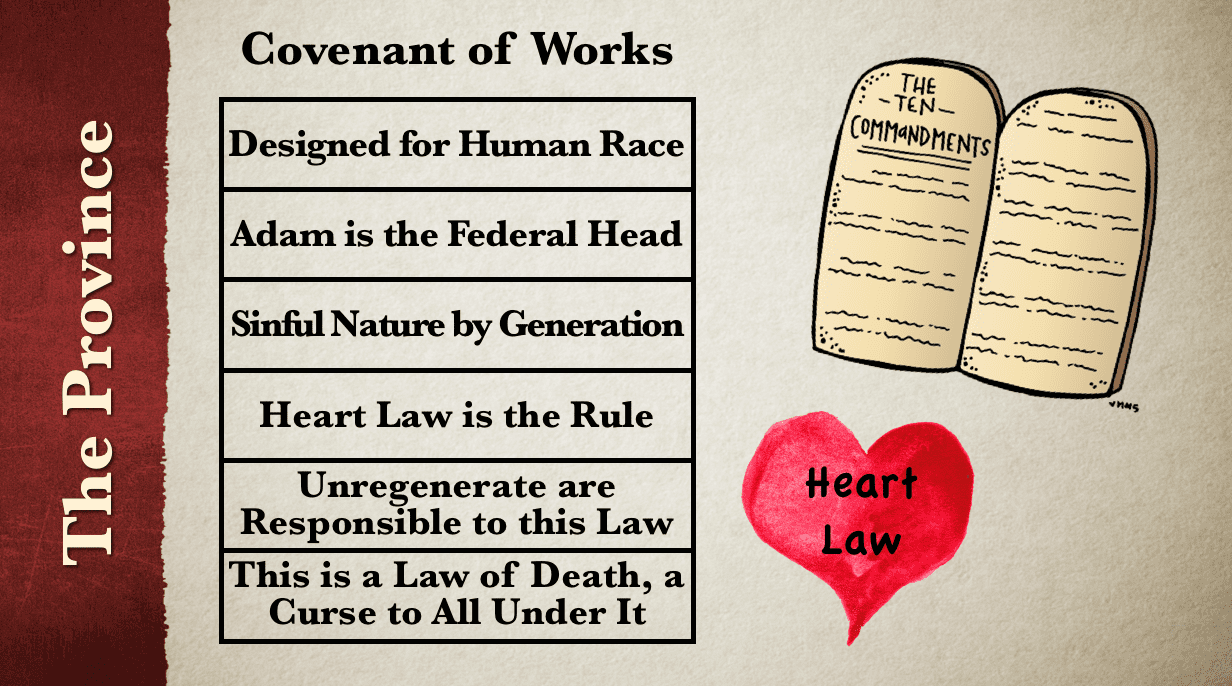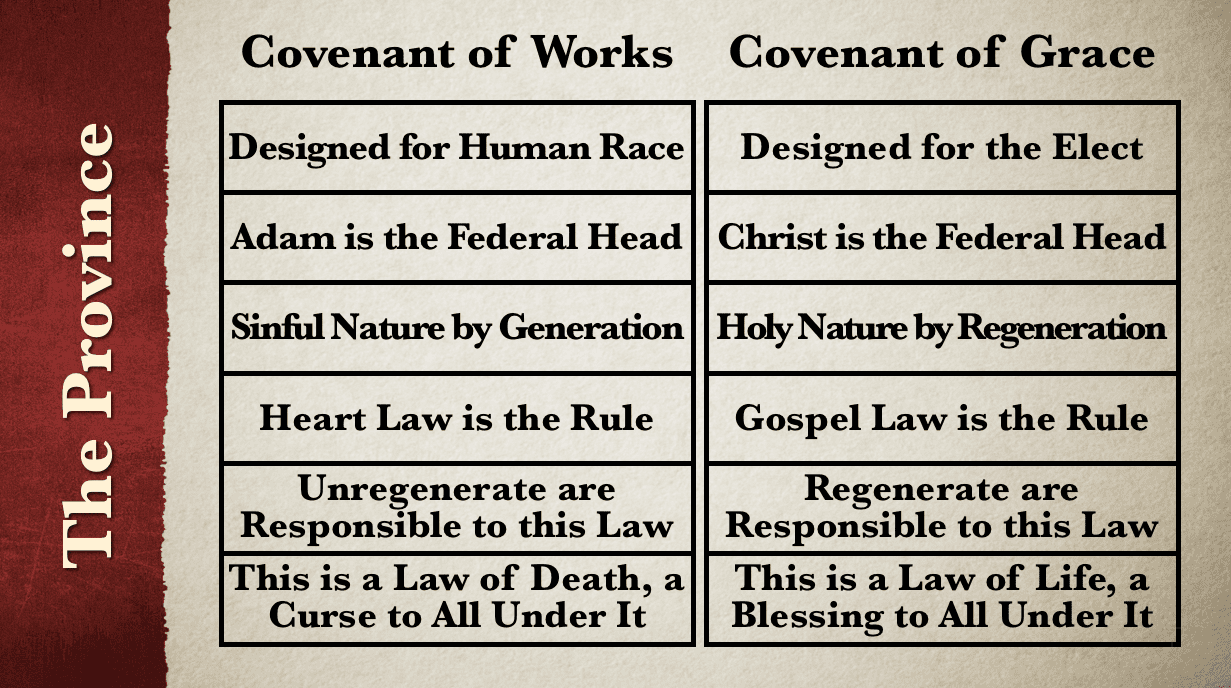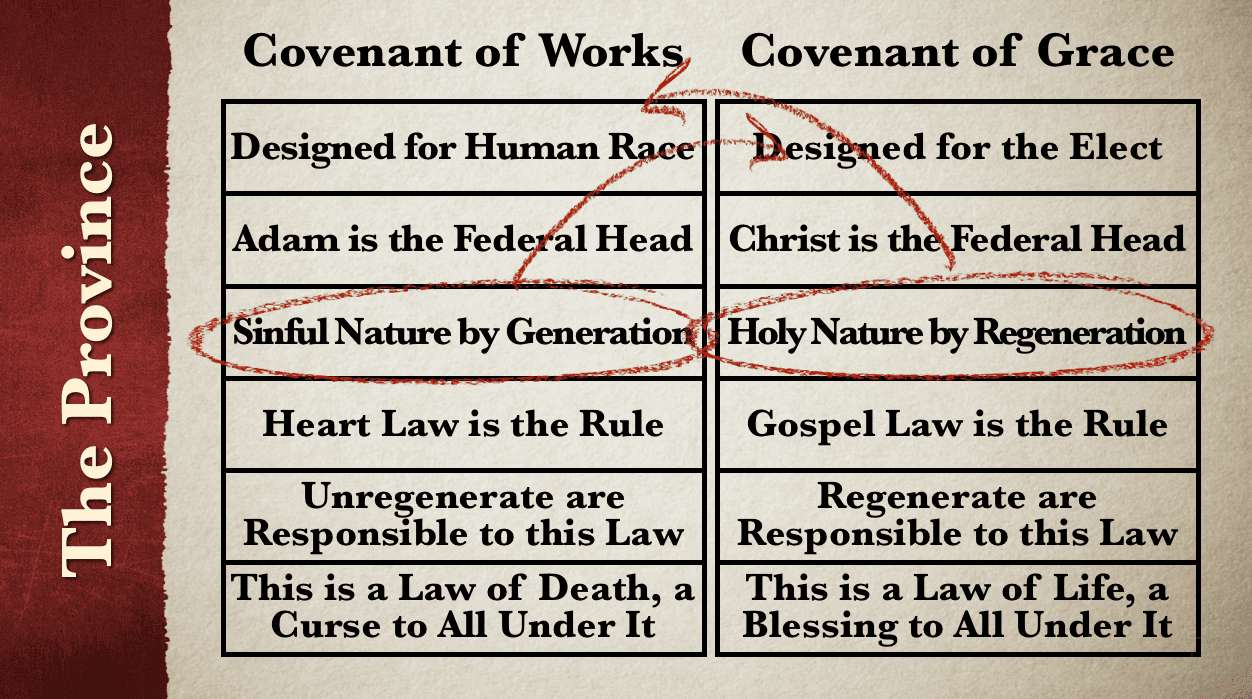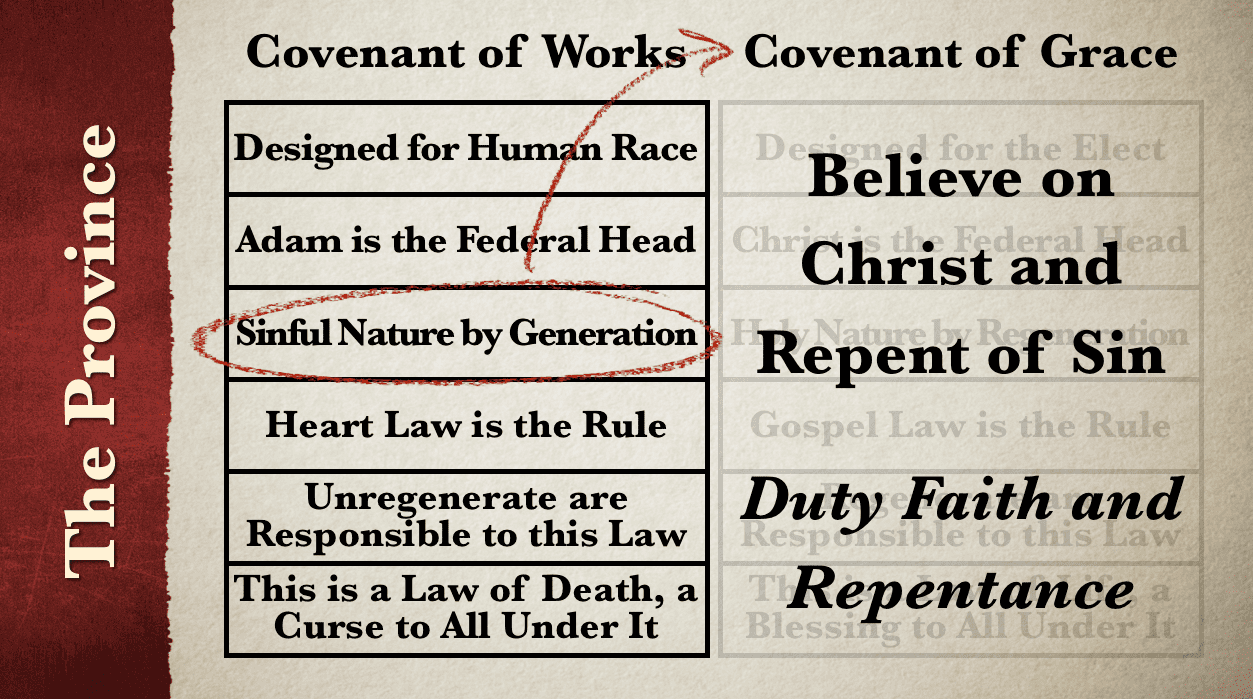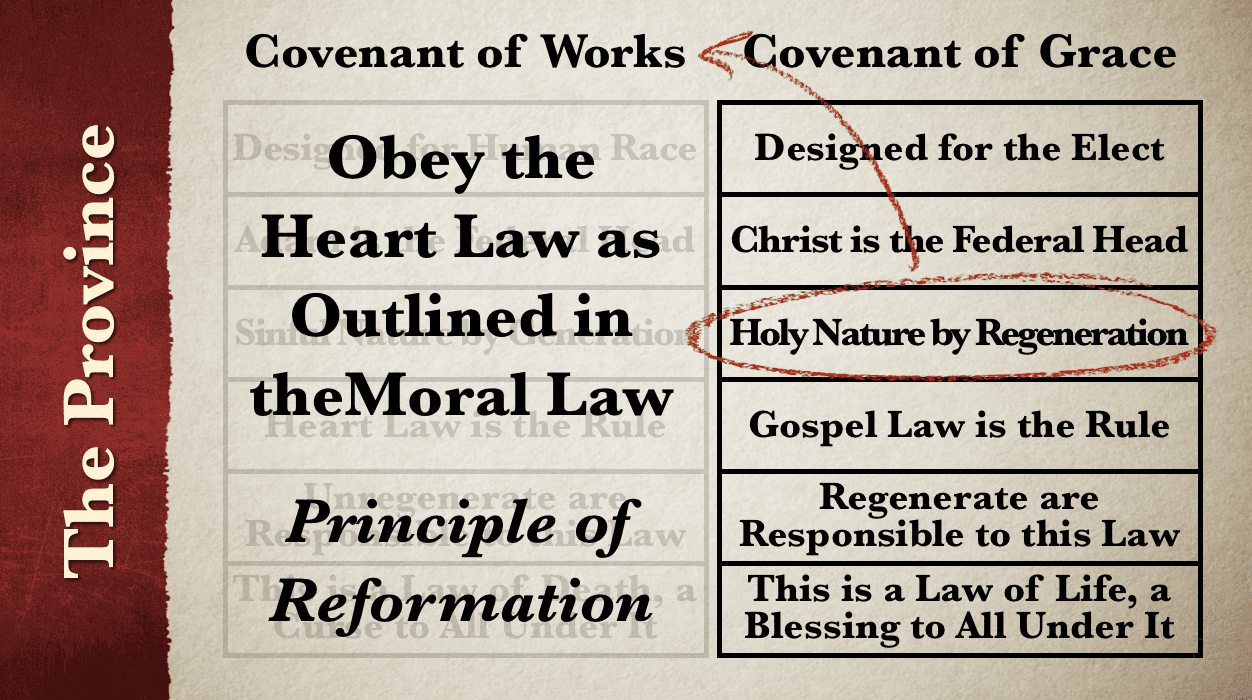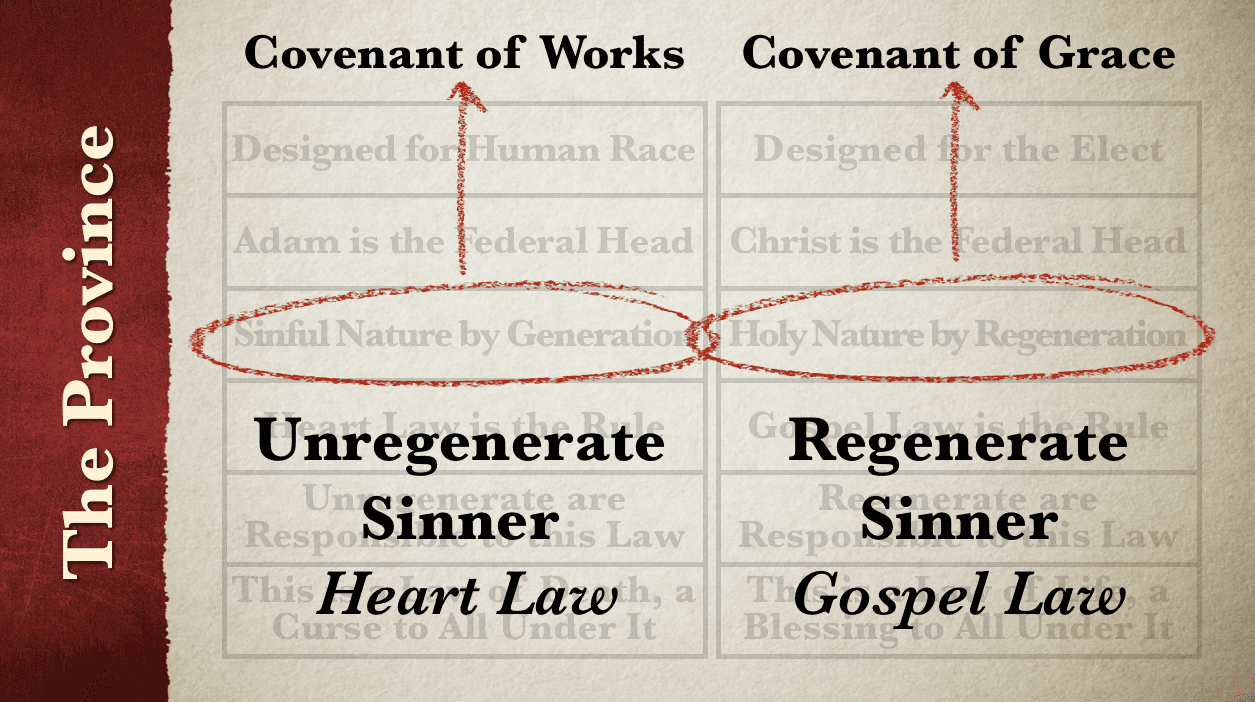
1 The Covenant Borders of the Gospel Law
Jesus described a man preaching the gospel to sinners, as a farmer ploughing a field—Luke 9:62: “And Jesus said unto him, No man, having put his hand to the plough, and looking back, is fit for [preaching] the kingdom of God.” The idea is, a Christian who takes up the Bible, for the purpose of preaching it to others, must be like the farmer who takes up the plough for the purpose of preparing the soil for planting seed—just as no farmer is fit to be a farmer if he looks back with carelessness after beginning his work, so no Christian is fit to be a preacher of the gospel if he looks back with carelessness after beginning his work.
The analogy, therefore, comes down to this:
The Christian is compared to a farmer; the Bible is compared to a plough; the souls of men are compared to the soil of the earth. As the farmer ploughs the soil of the earth, so the Christian preaches the Bible to the souls of men.
Here is a review of the first five lessons when comparing a plough to the Bible: (1) A plough is designed to prepare the soil before seed is planted; (2) A plough must cut through the dirt and pluck up weeds, creating wide wounds in the earth; (3) A plough must pass over the entire field if it is to be fully cultivated; (4) A plough does not actually plant the seed; (5) A farmer must give much time and effort to plough hard and thorny ground.
We now turn to the sixth lesson—Once the seed is planted, there is no more need for ploughing.
Ploughing the field and planting the seed are two different things. The purpose of ploughing the field is to break up the hard earth and uproot the overgrown weeds. Unless the earth is broken up and the weeds uprooted, no seed will survive in that hostile environment. Ploughing the field is therefore in preparation to planting the seed. The purpose of planting the seed is to gain a harvest. Now, the farmer doesn’t actually do the planting—all the farmer can do is scatter it. The actual planting, or seed taking root, belongs to the work of God (He gives the increase). Nevertheless, the point is clear—there is a distinct difference between ploughing the field and planting the seed.
This is an excellent analogy for the twofold message every Christian is to preach to his/her unbelieving family and friends. The first message is the Covenant of Works—the Covenant of Works is like ploughing the hardened heart of the sinner, and uprooting the overgrown weeds of ungodly philosophies and false sciences. It is in preparation for preaching the second message, the Covenant of Grace—preaching the Covenant of Grace is like scattering the seed of the gospel to the hearts of sinners. We do not know into which hearts the gospel seed will take root, for that is the work of God, but it is nevertheless the Christian’s job to scatter the gospel seed to all sinners.
Now, think about the farmer again. Once he has scattered the seed, and it has taken root, there is no more need for the plough. What would happen if the farmer ploughs the field with planted seeds? Well, he would destroy his crop. So, apply this to the soul that has had the gospel seed take root—of what good will the plough of the Covenant of Works do the believer in Christ? None! Absolutely no good will come of a believer relating to God on the basis of the Covenant of Works. And yet, that is precisely what many preachers are forcing upon God’s people. Many preachers will demand that the law inscribed upon the heart, and expressed by the Ten Commandments, is the perfect rule, or law, by which God’s people are to be governed. However, to make the law inscribed upon the heart, and expressed by the Ten Commandments, the perfect rule for the believer’s life, is to pull the plough over the soul again. “But,” you ask, “If the believer in Christ is not to be governed by the law inscribed on the heart, and expressed by the Ten Commandments, does that mean he/she isn’t bound to keep any law? Does that mean the believer in Christ is without a law? Does that mean the believer in Christ has a license to do anything he/she wants?” Of course, the answer to these questions is, No! But the questions reveal that this is a confusing subject for many Christians. If we are to unravel the confusion, then the questions must be answered under four headings:
I. The Province of Gospel Law.
II. The Principle of Gospel Law.
III. The Precepts of Gospel Law.
IV. The Promises of Gospel Law.
Given the importance of the subject, I will not rush through the teaching. I will therefore look only at the Province of Gospel Law in this study. What is the province of the Gospel Law? In a nutshell, there is a Heart Law and a Gospel Law—and each belongs to a restricted province. The Heart Law never trespasses into the province of the Gospel Law, and the Gospel Law never trespasses into the province of the Heart Law. To better explain this matter, I will gather my thoughts under four headings:
1. The Heart Law Belongs To The Province Of The Covenant Of Works.
2. The Gospel Law Belongs To The Province Of The Covenant Of Grace.
3. The Confusion Exists When The Heart Law Or Gospel Law Trespass Each Other’s Province.
4. Understanding The Province Of The Gospel Law Strikes At The Very Heart Of Living Godly In Christ Jesus.
Let us consider the first heading:
1. The Heart Law Belongs To The Province Of The Covenant Of Works.
Here are some things to remember about the Covenant of Works: (1) It is designed for the whole human race—everyone is brought into the world under its terms and promises; (2) Adam is the Federal Head—by his disobedience, he has brought sin, death and judgment upon everyone he represents; (3) Sinful nature by generation—every person brought into this world by virtue of a human father is conceived in sin and shaped in iniquity; (4) Heart Law is the rule—God has inscribed a law upon the heart, and every person is responsible to perfectly obey this law; (5) Unregenerate are duty-bound to this law—their duty is to first, to love God supremely and second, to love their neighbor as themselves; (6) This is a law of death, and a curse to all that are under it—no one is able to earn salvation by keeping this law.
The Ten Commandments is a specific application of the Heart Law to the nation of Israel. The Ten Commandments form one of three divisions of a law God gave to them through Moses. Because they were to be a religious people, God gave them a ceremonial law; because they were to be a righteous people, God gave to them a judicial law; and because they were to be a holy people, God gave to them a moral law. Hence—Proverbs 14:34: “Righteousness exalteth a nation: but sin is a reproach to any people.” Never was the Ten Commandments intended to serve as a rule for the whole human race. However, because the Ten Commandments are derived from the Heart Law, they are righteous commandments.
Jesus dealt with this issue when one of the scribes asked Him, “Which is the first and greatest commandment of all?” Jesus answered him—Mark 12:29-31: “The first of all the commandments is, Hear, O Israel; The Lord our God is one Lord: and thou shalt love the Lord thy God with all thy heart, and with all thy soul, and with all thy mind, and with all thy strength: this is the first commandment. And the second is like, namely this, Thou shalt love thy neighbour as thyself. There is none other commandment greater than these.” You see how Jesus reduced all of the Mosaic Commandments under two basic headings—(1) To love the Lord God supremely; (2) To love one’s neighbor as himself? These are the two commandments belonging to the Heart Law.
2. The Gospel Law Belongs To The Province Of The Covenant Of Grace.
Here are some things to remember about the Covenant of Grace: (1) It is designed for the Elect—from eternity, God the Father set His special love upon a remnant of the human race, and this gracious covenant is prepared only for them. Think of the Father’s electing love in terms of a set of parents adopting orphan children. Out of one hundred children in the orphanage, the parents choose only three to return home with them. Whereas ninety-seven children remain in the province of the orphanage, the other three are given the unique privilege of living in a new province. Such is the electing love of the Father, “for so it seemed good in His sight.” (2) Christ is the Federal Head—by His perfect obedience to the Heart Law, Christ has earned eternal life for everyone He represents; and by His atoning death on the cross, He delivered the sinner from sin, death and judgment; (3) Holy nature by regeneration—every sinner that has been chosen by the Father and redeemed by the Son will be born again by the Spirit of God. The new birth is that experience whereby the Holy Spirit imparts to the soul of the sinner a new nature/life in Christ. This new nature is created in righteousness and true holiness; (4) Gospel Law is the rule—having received a new nature, every regenerate sinner is blessed to walk in newness of life (the essence of the Gospel Law); (5) Regenerate are responsible to this law—their souls have been united to Christ, even as a branch to a vine, and through Him they are able to bear fruit and walk in good works; (6) This is a law of life, and a blessing to all that are under it—everyone under this law enjoys spiritual life, spiritual health and spiritual blessings.
“But,” says someone, “Where in the Bible does it say the regenerate sinner is no longer under the province of the Covenant of Works…that he/she is no longer responsible to the Heart Law?” Romans 10:4: “For Christ is the end of the law for righteousness to every one that believeth.”
“But,” says another, “Does this mean that if a regenerate sinner is no longer responsible to the Heart Law, that he/she lives by no law…does a believer therefore have a license to sin?” Romans 5:20-6:2: “Moreover the law entered, that the offence might abound. But where sin abounded, grace did much more abound: that as sin hath reigned unto death, even so might grace reign through righteousness unto eternal life by Jesus Christ our Lord. What shall we say then? Shall we continue in sin, that grace may abound?God forbid. How shall we, that are dead to sin, live any longer therein?”
“Well, then,” you say, “If the regenerate sinner is no longer responsible to the Heart Law, but he/she is not to live in sin, then by what law does the Christian live?” After the sinner has been born again, he/she is experientially brought under the terms and promises of the Gracious Covenant, and it is the law under the Gracious Covenant that now governs the believer’s life. That law is called in Scripture, “The Law of Christ”. I will give you two examples:
First, the Apostle Paul recognized himself under the Law of Christ. Please notice, Paul distinguishes between the Moral Law (Ten Commandments) under which the Jews were subject; the Heart Law under which the Gentiles (and Jews) were subject; and the Gospel Law (Law of Christ) under which he, as a regenerate sinner, was subject—1 Corinthians 9:19-23: “For though I be free from all men, yet have I made myself servant unto all, that I might gain the more. And unto the Jews I became as a Jew, that I might gain the Jews; to them that are under the law, as under the law, that I might gain them that are under the law; to them that are without law, as without law, (being not without law to God, but under the LAW OF CHRIST,) that I might gain them that are without law. To the weak became I as weak, that I might gain the weak: I am made all things to all men, that I might by all means save some. And this I do for the gospel’s sake, that I might be partaker thereof with you.”
Second, the Apostle Paul admonished the regenerate sinners in Galatia to fulfill the Law of Christ. Reading the passage in context (though not its entirety, for space and time do not permit), I will highlight the main movements of the text:
The Province of the Gospel Law—Galatians 5:16-18: “This I say then, Walk in the Spirit, and ye shall not fulfil the lust of the flesh. For the flesh lusteth against the Spirit, and the Spirit against the flesh: and these are contrary the one to the other: so that ye cannot do the things that ye would. But if ye be led of the Spirit, ye are not under the law.”
The Outworking of the Heart/Moral Law—Galatians 5:19-21: “Now the works of the flesh are manifest, which are these; Adultery, fornication, uncleanness, lasciviousness, idolatry, witchcraft, hatred, variance, emulations, wrath, strife, seditions, heresies, envyings, murders, drunkenness, revellings, and such like: of the which I tell you before, as I have also told you in time past, that they which do such things shall not inherit the kingdom of God.”
The Province of the Gospel Law—Galatians 5:22-25: “But the fruit of the Spirit is love, joy, peace, longsuffering, gentleness, goodness, faith, meekness, temperance: against such there is no law. And they that are Christ’s have crucified the flesh with the affections and lusts. If we live in the Spirit, let us also walk in the Spirit.”
The Outworking of the Gospel Law—Galatians 5:26-6:2: “Let us not be desirous of vain glory, provoking one another, envying one another. Brethren, if a man be overtaken in a fault, ye which are spiritual, restore such an one in the spirit of meekness; considering thyself, lest thou also be tempted. Bear ye one another’s burdens, and so fulfil the LAW OF CHRIST.”
3. The Confusion Exists When The Heart Law Or Gospel Law Trespass Each Other’s Province.
Many preachers make the unregenerate sinner responsible for Gospel Law privileges—they will say to the unregenerate sinner, “You must believe on Christ and repent of your sins to the saving of your soul.” This is what is meant by Duty-faith and Duty-repentance preaching.
But do you see what these preachers are doing? They are making demands of the unregenerate, for things that are outside of their province. The unregenerate not only have no spiritual ability to savingly believe and repent (for they are dead in sin), but they are given no authority to savingly believe and repent. The only way for a sinner to be given the ability and authority to savingly believe and repent is after the Holy Spirit has imparted a new nature/life to the soul. Until then, the unregenerate sinner is confined to the province of the Covenant of Works.
But many preachers do not stop there. They will then make the regenerate sinner responsible for Heart Law duties—they will say to the regenerate sinner, “You must perfectly obey the Heart Law, which is outlined in the Moral Law (Ten Commandments), for the growth of grace in your soul.”
But again, do you see what these preachers are doing? They are making demands upon the regenerate, for things that are outside of their province. The regenerate have been delivered from the Covenant of Works, even as those three orphan children were delivered from the orphanage—just as those orphans now belong under the dominion and rule of loving parents, having absolutely nothing to do with the orphanage or its rule, so regenerate sinners belong under the dominion and rule of the Gracious Covenant, having absolutely nothing to do with the Covenant of Works and its rule. In fact, all that the Heart Law and Moral Law are able to do for a regenerate sinner is bring about a type of outward reformation (a form of godliness with no inner power)—this is because the Covenant of Works along with its laws have no Christ in them.
You see, this is the source of the greatest confusion dominating churches today. And the results are devastating. Unregenerate sinners are being told to do things that only regenerate sinners are capable and authorized to do; and regenerate sinners are being told to do things that only unregenerate sinners are responsible to do. Rather than the preachers using the Covenant of Works as a plough to break up the hardened hearts of unregenerate sinners, they are trying to use it as a means for getting Christians to grow in grace—but just as a farmer will destroy his crop if he ploughs the field after the planting, so many preachers are doing a lot of damage to the people of God by continuing to plough their souls with the Covenant of Works. And again, rather than the preachers using the Covenant of Grace as the planting and nourishing of the gospel seed, they are using it as the plough to break up the unregenerate sinner’s heart—they are hitting the unregenerate sinner over the head with the Gracious Covenant, with threatening demands such as “Believe on Christ, or you’ll be damned!”
These preachers have it all backwards—they are preaching Gospel Law privileges to the unregenerate and Heart Law duties to the regenerate. In order to prevent this type of confusion, which ultimately leads to a false gospel, it is important to keep the two Covenants separate. But sadly, I fear the confusion is greater still—perhaps these preachers have never even heard of the two Covenants.
4. Understanding The Province Of The Gospel Law Strikes At The Very Heart Of Living Godly In Christ Jesus.
I want to show you how the regenerate sinner is always depicted as living godly in Christ Jesus within the parameter of the Gracious Covenant. Never is the believer instructed to cross over from the Gracious Covenant into the Covenant of Works in order to live godly in Christ. And, never is a believer even depicted as crossing over from the Gracious Covenant into the Covenant of Works, in order to live godly in Christ. The Believer is always presented in Scripture as living godly in Christ Jesus within the boundaries of the Gracious Covenant. Here are three examples:
(1) Jude 20,21: “But ye, beloved, building up yourselves on your most holy faith, praying in the Holy Ghost, keep yourselves in the love of God, looking for the mercy of our Lord Jesus Christ unto eternal life.” Please note, the believer’s “most holy faith” is the Law of Christ—and it is within the parameter of the gracious covenant (the love of God the Father, the mercy of the Lord Jesus Christ and communion in the Holy Spirit).
(2) Titus 2:11-14: “For the grace of God that bringeth salvation hath appeared to all men, teaching us that, denying ungodliness and worldly lusts, we should live soberly, righteously, and godly, in this present world; looking for that blessed hope, and the glorious appearing of the great God and our Saviour Jesus Christ; who gave himself for us, that he might redeem us from all iniquity, and purify unto himself a peculiar people, zealous of good works.” Please note, it is the grace of God (the Gracious Covenant) that teaches the believer to live soberly, righteously and godly in this present world. In what way does the believer deny ungodliness and worldly lusts? By following the Ten Commandments or keeping the Heart Law? No. But by looking for that blessed hope, even the glorious appearing of the great God and our Saviour Jesus Christ. For He it is that has given Himself for us, that He might redeem us (purchase us from iniquity and the curse of the Covenant of Works). He it is that has given Himself for us in order to purify unto Himself a peculiar people (a people called out of the darkness of the Covenant of Works, into the light of the Gracious Covenant). And He has purified this peculiar people that they might be zealous of good works (zealous to walk with Christ in righteousness within the parameters of the Gracious Covenant).
(3) Colossians 2:6-10: “As ye have therefore received Christ Jesus the Lord, so walk ye in him: rooted and built up in him, and stablished in the faith, as ye have been taught, abounding therein with thanksgiving. Beware lest any man spoil you through philosophy and vain deceit, after the tradition of men, after the rudiments of the world, and not after Christ. For in him dwelleth all the fulness of the Godhead bodily. And ye are complete in him, which is the head of all principality and power:” Please note—You, the regenerated sinner, having received Christ Jesus the Lord; you that have been experientially brought under the terms and promises of the Gracious Covenant; what are you to do? Are you to now follow the Ten Commandments? Are you to now follow the Heart Law? No. You are to “walk in Christ”—you are rooted in Him (born again) and now you are to grow up in Him; you are to be established in the faith (the Law of Christ). The Apostle Paul presses this point when he warns the believer to BEWARE, lest anyone should try and drag you back over to the province of the Covenant of Works; lest anyone should try to beguile you through philosophy, and vain deceit, and after the tradition of men and after the things of the world. You have been delivered from the Covenant of Works—all of that philosophy, vain deceit, tradition of men and things of the world belongs to the province of the Covenant of Works. “No,” says Paul, “You have been brought under the Covenant of Grace, and since you have experienced this spiritual union with Christ, you now recognize that you are complete in Him! You have no need to venture outside of Christ” That is precisely what Paul was getting at in 1 Corinthians 1:30: “But of him are ye in Christ Jesus, who of God is made unto us wisdom, and righteousness, and sanctification, and redemption.” You see, Christ Jesus is made everything to you—if you go to the Heart Law, or the Ten Commandments, or the Covenant of Works for wisdom, then you’re stepping outside of your new province in Christ; if you go to the Heart Law, or the Ten Commandments, or the Covenant of Works for righteousness, then you are stepping outside of your new province in Christ; if you go to the Heart Law, or the Ten Commandments, or the Covenant of Works for sanctification, then you are stepping outside of your new province in Christ. Don’t you see, this whole issue of the province of the Gospel Law strikes at the very heart of how you are to live godly in Christ Jesus.
Now, when you compare this Gospel Law (the province of the Gracious Covenant) with the Heart Law (Mk 12:29-31) and Moral Law (Ex 20) (the province of the Covenant of Works), you will discover this very clear difference between them—the Heart Law and Moral Law have absolutely no Christ in them; neither do they have the effectual working of the Holy Spirit. The best anyone can hope for when attempting to keep either of these laws is an outer reformation of life (form of godliness with no inner power). These laws cannot regenerate the soul of a sinner, neither can they bring the soul of a regenerate sinner near to God. Only the Lord Jesus Christ can do this, and that is why the believer is governed by the Gospel Law under the Gracious Covenant.
Conclusion:
It has been shown in this study that there are two different Covenants which govern two types of people. First, there is the Covenant of Works, and all unregenerate sinners (not born again) are duty-bound to keep the Heart Law of this Covenant (to love God supremely, and to love one’s neighbour as himself). This Heart Law was applied to the nation of Israel under Ten Commandments. Second, there is the Covenant of Grace, and all regenerate sinners (born again) are duty-bound to keep the Gospel Law of this Covenant. The essence of this Gospel Law is life in Christ—as He is the vine and the regenerate sinner is the branch, so the believer bears fruit in and through Christ. Part of this fruit is a zeal to do good works, and these good works are done through the effectual working of the Holy Spirit.
Henceforth, the Heart Law of the Covenant of Works has no life in it, neither is there spiritual life in the hearts of the unregenerate who try to keep it. But the Gospel Law of the Covenant of Grace has life in it, and there is spiritual life in the hearts of the regenerate who keep it. Whereas there is no Christ in the Heart Law, yet Christ is at the very heart of the Gospel Law.
Jared Smith served twenty years as pastor of a Strict and Particular Baptist church in Kensington (London, England). He now serves as an Evangelist in the Philippines, preaching the gospel, organizing churches and training gospel preachers.
Jared Smith's Online Worship Services
Jared Smith's Sermons
Jared Smith on the Gospel Message
Jared Smith on the Biblical Covenants
Jared Smith on the Gospel Law
Jared Smith on Bible Doctrine
Jared Smith on Bible Reading
Jared Smith's Hymn Studies
Jared Smith on Eldership
Jared Smith's Studies In Genesis
Jared Smith's Studies in Romans
Jared Smith on Various Issues
Jared Smith, Covenant Baptist Church, Philippines
Jared Smith's Maternal Ancestry (Complete)



